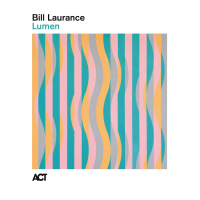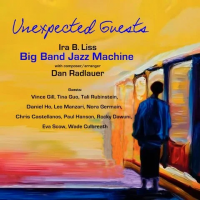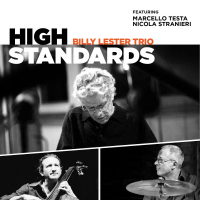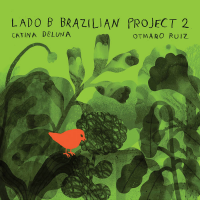Home » Jazz Articles » Album Review » ECV: Sticks and Stones
ECV: Sticks and Stones
Vic Juris
guitar1953 - 2019

Pat Metheny
guitarb.1954

Adam Rogers
guitarb.1965

Roddy Ellias
guitarb.1949

Ralph Towner
guitarb.1940
Like Monday's Dream (Kwimu Music, 2014), Sticks and Stones is a trio date that feels as if the musicians are performing just feet away in a small space...a living room, perhaps. But eschewing Monday's Dream's more conventional guitar/bass/drums configuration for a chamber-like guitar/piano/bass lineup renders Sticks and Stones even more intimate. It would be all too easy to compare Ellias to Towner, but in almost every way they are completely different players and composers, even though Sticks and Stones' spacious, largely introspective chamber-like setting would make it an easy fit for ECM Records, the American expat's label for more than 45 years.
Contrasting Monday's Dream's exclusive venue for his occasionally abstruse but eminently appealing writing, Sticks and Stones is a more egalitarian affair, its set of five new Ellias compositions augmented by one each from his trio mates, alongside

Miles Davis
trumpet1926 - 1991

Marc Copland
pianob.1948

Adrian Vedady
bassDespite his star continuing to rise, in particular through his recent ECM recordings with bassist

Gary Peacock
bass, acoustic1935 - 2020

John Abercrombie
guitar1944 - 2017
Vedady, another player who is as much a deep listener as he is a musical instigator, provides both a firm anchor and contrapuntal foil on equal footing with his trio mates. He's also the direct connection between Ellias and Copland. The bassist goes back some years with Ellias, particularly when the now-retired guitarist was living in MontrЁҰal as professor emeritus at MontrЁҰal's Concordia University; he was also a participant on the guitarist's Monday's Dream. Sticks and Stones may be Ellias' first formal encounter with Copland, but the bassist has previously collaborated with the pianist, in particular at an impressive (but, thanks to a particularly noisy crowd during the first set, frustrating) date at Ottawa's now-defunct CafЁҰ Paradiso.
The profound chemistry and specific sound evinced by this trio is all the more remarkable for its members having only met in MontrЁҰal's Studio 451 for two days of recording in May, 2017, followed by a well-received gig at the TD Ottawa Jazz Festival two months later. The individual participants' differing compositional styles are responsible for the breadth that renders this 55-minute set so appealing from start to finish. Still, Sticks and Stones' success is predicated on how this trio breathes its own collective personality into the music, lending it a consistency and "whole greater than the sum of its parts" ethos, no matter whose material is being interpreted.
Even a tune as evergreen as the modal "Nardis" becomes something fresh and still-relevant almost 60 years after Davis wrote it for

Cannonball Adderley
saxophone1928 - 1975
It's a version that moves, seemingly effortlessly, between rhythmic ambiguity and definitive swing, not just because of Vedady's muscular yet ever-shifting support, but through Ellias and Copland's ability to, at times, imply a pulse while, at other times, providing one that's more definitive. Copland solos first, his motivic inventions often mirrored with transcendent synchronicity by Ellias. If Copland's reputation has been built largely on his distinctive pedal work and a delicate touch few can match, here he demonstrates a firmer, more muscular approach as well, even as there's not a single note wasted or lacking in significance.
As Copland's solo closes with a simple but ambiguous ascending phrase, Ellias picks it up as the pianist moves to more dissonant voicings that lead to one of the guitarist's most exhilarating solos of the set. From initially spare intervallic leaps, the guitarist builds his solo gradually, his lines building in motion and density as he occasionally peppers them with chordal injections. Copland and Vedady move alongside Ellias with subtle synchronicity, the trio collectively picking up and running with ideas that might come from any one of them, only to be pushed in a different direction by another. This is communication at its most mitochondrial.
Vedady also takes an impressive solo on "Nardis," but it's his own dark-hued "Requiem" that demonstrates the bassist's true mettle. From a deceivingly challenging, long-form theme to a solo that, over the sparest of accompaniment, weaves melodies through its changes and sets a high bar, which the bassist easily meets and raises throughout the set, it positions Vedady as a musician well-deserving of greater recognition.
As is true of Ellias. He has managed some good press over the years, in both the contemporary new music scene and in the jazz world where, as just one example, he was called to sit in for the unavailable

Peter Bernstein
guitarb.1967

Dr. Lonnie Smith
organ, Hammond B31942 - 2021

Anthony Pinciotti
drumsHis CD-opening "Folksong" is just one of five examples on Sticks and Stones where the guitarist demonstrates such breadth in composition...and performance. A gently finger-picked opening with a simply ascending melody, first by Ellias alone, then doubled by Vedady and Copland, and, finally, with the pianist adding supporting arpeggiations, leading to a series of solos, Ellias' is notable for his injection of slight Middle Eastern sonorities that suggest even broader touchstones.
Elsewhere, "Hymn" begins with a harmonic bass ostinato, over which the guitarist layers first a single, finger-picked chord, followed by a series of initially dissonant changes which ultimately resolve into a more pastoral context where, with its harmonic specificity and thematic stops and starts, ECV comes closest to evoking Towner and his longstanding group

Oregon
band / ensemble / orchestraFrom Ellias' oblique title track to the gentle closer, "Nostalgia," Ellias, Copland and Vedady demonstrate a rare ability to get to the heart of the material, no matter if it's more thoughtful or thought-provoking. The album title references Albert Einstein, who once said "I know not with what weapons World War III will be fought, but World War IV will be fought with sticks and stones." Given the dangerous times in which we now seem to live, Ellias' brief liner notes suggest that Sticks and Stones "seeks to find light and humanity in the darkness." A resounding success on that and many other fronts, in a time when so many artists are forced to release their music independently, ECV is a trio that merits broader attention, and Sticks and Stones an album that shouts, in its most soft and luminescent fashion, for a follow-up. ">
Track Listing
Folksong; Requiem; Waves; Hymn; Sonnet; Nardis; Sticks and Stones; Nostalgia.
Personnel
Album information
Title: Sticks and Stones | Year Released: 2017 | Record Label: Kwimu Music
Tags
Comments
PREVIOUS / NEXT
Support All About Jazz
 All About Jazz has been a pillar of jazz since 1995, championing it as an art form and, more importantly, supporting the musicians who make it. Our enduring commitment has made "AAJ" one of the most culturally important websites of its kind, read by hundreds of thousands of fans, musicians and industry figures every month.
All About Jazz has been a pillar of jazz since 1995, championing it as an art form and, more importantly, supporting the musicians who make it. Our enduring commitment has made "AAJ" one of the most culturally important websites of its kind, read by hundreds of thousands of fans, musicians and industry figures every month.









 Buy Now
Buy Now

















